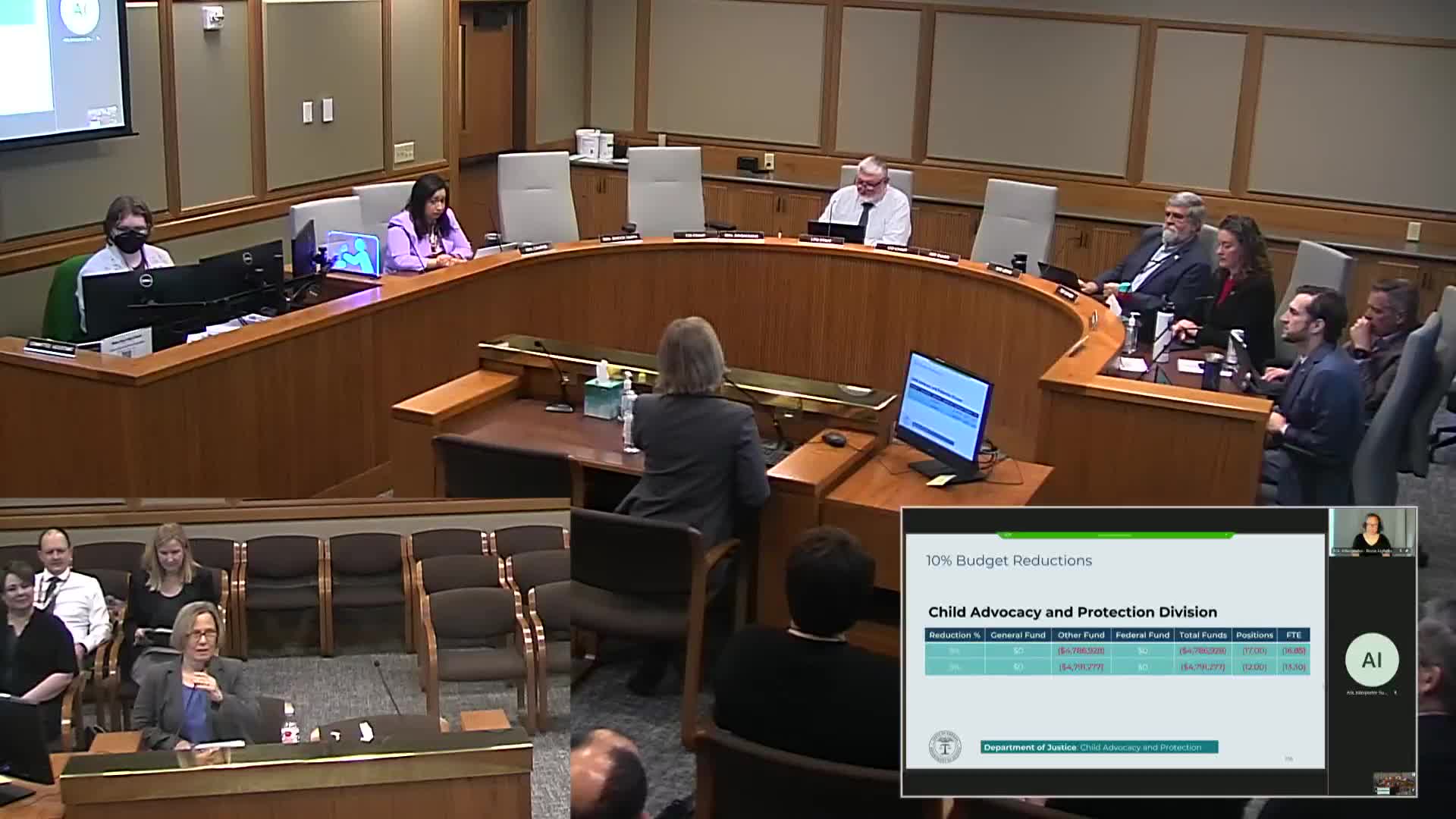DOJ deputy AG details administrative services staffing shortfalls, IT and billing modernization requests
Get AI-powered insights, summaries, and transcripts
Subscribe
Summary
Deputy Attorney General Lisa Uddland described staffing shortages in financial services and human resources, proposed policy option packages to add HR and IT resources, and outlined a major legal tools project (Justice Nexus) and related funding requests during the HB 5014 informational hearing.
Deputy Attorney General Lisa Uddland provided the Public Safety Committee an overview of the Department of Justice Administrative Services Division and related budget requests as part of the informational hearing on House Bill 5014.
"The mission of the administrative services division is to advance the department of justice's work by providing expert services in core business and operational areas," Uddland told the committee, describing the division as the sole source of administrative support for about 1,500 DOJ employees across 19 locations.
Uddland outlined several operational pressures. Financial services paid roughly 13,000 invoices during the past biennium, processed about 49,000 warrants through the state financial system, and issued nearly 30,000 billing invoices to more than 690 clients, she said. The division has experienced turnover and long vacancies in key financial leadership positions: the chief financial officer post has been vacant for over a year and the financial services manager position has been intermittently vacant, Uddland said.
Human resources staffing has not kept pace with agency growth, she said: DOJ added about 66 positions since 2019 but HR staffing increased by only two positions (one payroll and one HR analyst). The division currently has roughly one HR professional per 100 employees, Uddland said; she cited the Society for Human Resource Management guideline of about 1.7 HR staff per 100 employees as a comparative benchmark. The department’s internal audit found inconsistent onboarding documents and processes and role confusion among HR, IT and hiring managers.
To address these gaps, DOJ proposed policy option package (POP) 154 for HR staffing, requesting $2,900,000 in other funds that would add $2.06 to the department’s legal rate and would fund 3.5 additional HR analysts, one payroll position, and a project management office to lead agency‑wide process improvements. A separate training POP would add internal training and onboarding capacity; Uddland said that request is $1,200,000 in other funds and would add $0.85 to the legal rate.
Uddland also described IT cost pressures and a request for POP 103 for information services of $2,200,000 in other funds that would add $1.57 to the legal rate. She said Cisco licensing costs increased about 31% during the past biennium and that inflation has raised ongoing licensing and equipment replacement expenses.
The department is advancing a major IT modernization, the legal tools program, to replace outdated case management, timekeeping and billing systems. DOJ has signed a contract with Aon Nexus to acquire the Justice Nexus platform and has begun gap analysis and business process redesign. Uddland said the program requests $4,000,000 in total general fund (including $1,200,000 of 2023‑25 unspent general fund and $3,200,000 new general fund), and $13,300,000 in bonding authority (about $6,000,000 moved forward from a prior bond offering and $7.3 million new bonding authority). The department also requested corresponding other fund limitation and $13,400,000 for employee costs associated with the project.
Uddland highlighted recent cost savings and service achievements: the information services help desk resolved over 24,000 tickets in the past biennium, and a firewall consolidation project saved more than $2.5 million. Facility consolidations reduced office footprint (the trial division gave up about 6,000 square feet and general counsel about 21,000 square feet) producing lease savings Uddland estimated at over $800,000 annually.
She warned that across administrative sections a 10% reduction would largely translate into reduced capacity rather than program elimination. Uddland closed by asking committee members to direct any follow‑up questions to DOJ staff and noting the department would provide requested materials.
